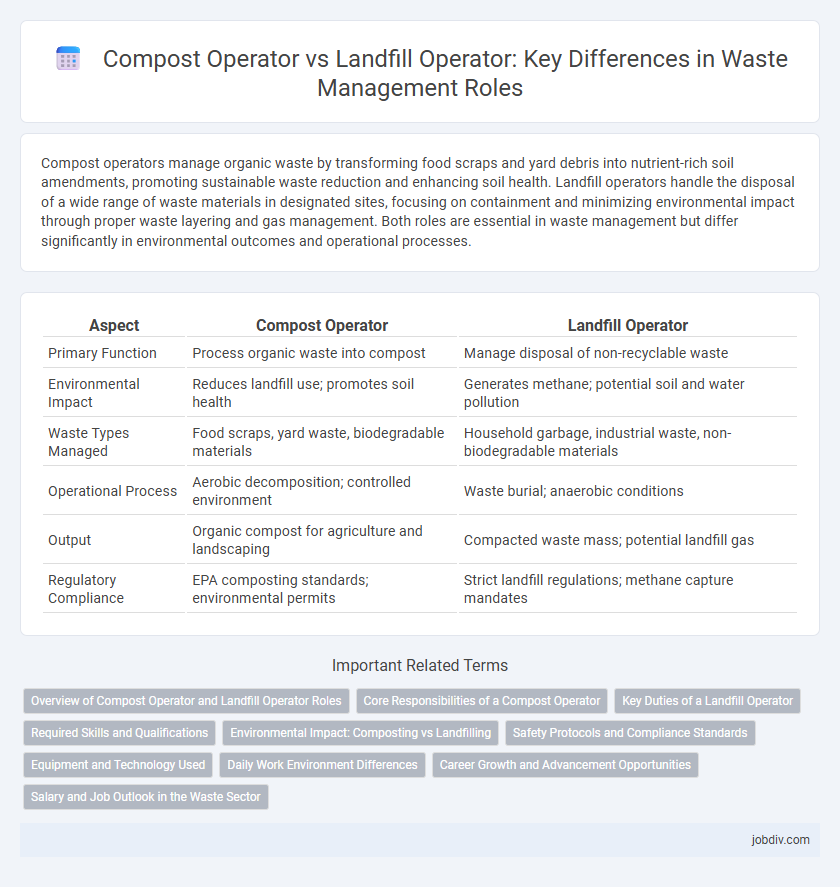Compost operators manage organic waste by transforming food scraps and yard debris into nutrient-rich soil amendments, promoting sustainable waste reduction and enhancing soil health. Landfill operators handle the disposal of a wide range of waste materials in designated sites, focusing on containment and minimizing environmental impact through proper waste layering and gas management. Both roles are essential in waste management but differ significantly in environmental outcomes and operational processes.
Table of Comparison
| Aspect | Compost Operator | Landfill Operator |
|---|---|---|
| Primary Function | Process organic waste into compost | Manage disposal of non-recyclable waste |
| Environmental Impact | Reduces landfill use; promotes soil health | Generates methane; potential soil and water pollution |
| Waste Types Managed | Food scraps, yard waste, biodegradable materials | Household garbage, industrial waste, non-biodegradable materials |
| Operational Process | Aerobic decomposition; controlled environment | Waste burial; anaerobic conditions |
| Output | Organic compost for agriculture and landscaping | Compacted waste mass; potential landfill gas |
| Regulatory Compliance | EPA composting standards; environmental permits | Strict landfill regulations; methane capture mandates |
Overview of Compost Operator and Landfill Operator Roles
Compost operators manage organic waste processing, transforming food scraps and yard waste into nutrient-rich compost through controlled decomposition. Landfill operators oversee the disposal of solid waste in designated sites, ensuring environmental compliance and efficient waste containment. Both roles are critical in waste management, with compost operators promoting sustainability and landfill operators ensuring safe waste isolation.
Core Responsibilities of a Compost Operator
A Compost Operator manages the decomposition process of organic waste, ensuring optimal conditions such as temperature, moisture, and aeration to produce nutrient-rich compost. They monitor microbial activity to accelerate biodegradation and maintain compliance with environmental regulations for safe waste recycling. Unlike landfill operators who focus on waste containment and leachate control, compost operators emphasize transforming organic waste into valuable soil amendments, promoting sustainability and waste diversion.
Key Duties of a Landfill Operator
Landfill Operators manage waste disposal by overseeing the safe and efficient operation of landfill sites, including daily coverage of waste, maintaining equipment, and monitoring environmental compliance. They perform routine inspections to prevent contamination and ensure leachate and gas control systems function properly. Their role involves strict adherence to regulations governing waste placement and site rehabilitation to minimize environmental impact.
Required Skills and Qualifications
Compost operators require knowledge of organic waste management, microbial processes, and soil science to effectively convert organic materials into nutrient-rich compost. Essential skills include equipment operation, environmental compliance, and quality control to ensure safe and efficient compost production. Landfill operators must be skilled in heavy machinery use, waste compaction techniques, and environmental regulations, with qualifications often including certifications in hazardous waste management and safety protocols.
Environmental Impact: Composting vs Landfilling
Compost operators significantly reduce greenhouse gas emissions by promoting aerobic decomposition, which produces minimal methane compared to anaerobic landfilling processes. Landfill operators manage waste that generates substantial methane, a potent greenhouse gas contributing to climate change, due to anaerobic conditions. Composting also enhances soil health by returning nutrients to the earth, whereas landfilling often results in long-term environmental risks such as leachate contamination and habitat disruption.
Safety Protocols and Compliance Standards
Compost operators adhere to strict safety protocols including protective gear for handling organic waste and regular monitoring of microbial activity to prevent pathogen exposure. Landfill operators comply with environmental regulations focusing on gas emission controls and leachate management to mitigate pollution risks. Both must follow OSHA standards and local environmental codes to ensure workplace safety and regulatory compliance.
Equipment and Technology Used
Compost operators utilize aerated static piles, in-vessel composters, and biofilters to manage organic waste efficiently, leveraging microbial activity for decomposition. Landfill operators rely on heavy machinery such as bulldozers, compactors, and gas collection systems designed to stabilize and manage large volumes of mixed waste while capturing methane emissions. Advanced monitoring technologies like sensors and GPS enhance operational control in both composting and landfill management.
Daily Work Environment Differences
Compost operators work primarily outdoors managing organic waste decomposition, monitoring temperature and moisture levels to ensure efficient breakdown. Landfill operators manage waste burial sites, often exposed to heavy machinery operation and odor control challenges, with tasks focused on compacting and covering waste layers. The daily environment for compost operators is typically less hazardous and more focused on biological processes, while landfill operators face more mechanical risks and regulatory compliance related to environmental protection.
Career Growth and Advancement Opportunities
Compost operators experience significant career growth through specialization in organic waste management, sustainable agriculture, and environmental compliance, often advancing to roles such as environmental project managers or sustainability consultants. Landfill operators have advancement opportunities in waste management supervision, environmental health and safety leadership, and regulatory compliance, with potential to move into regional or corporate waste operations management. Both careers offer pathways in environmental technology, but compost operators benefit from expanding demand for sustainable waste solutions and circular economy initiatives.
Salary and Job Outlook in the Waste Sector
Compost operators typically earn a median salary ranging from $40,000 to $55,000 annually, reflecting growing demand as sustainable waste management practices expand. Landfill operators, with salaries averaging between $45,000 and $60,000, face a steady job outlook driven by ongoing waste disposal needs despite increasing environmental regulations. The compost sector is projected to grow faster due to rising emphasis on organic waste recycling and circular economy initiatives.
Compost Operator vs Landfill Operator Infographic

 jobdiv.com
jobdiv.com